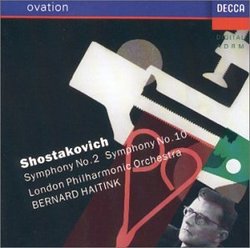Haitink's Tenth is polished and sincere, but it's shy of gre
Santa Fe Listener | Santa Fe, NM USA | 01/14/2007
(4 out of 5 stars)
"Haitink's groundbreaking cycle of the Shostakovich symphonies boasts excellent playing and recorded sound, along with a solid, Middle European approach. As such, it's never less than enjoyablue. But a great work calls for inspired conducting, and in the Tenth Sym., perhaps the masterpiece of Shostakovich's symphonic output, Haitink doesn't find special inspiration. Karajan, Stokowski, and Mravinsky all recorded outstanding versions (Stokowski's comes from a live concert in Chicago that's available on the CSO's house label). Compared to them, Haitink's reading is a bit foursquare and tends to lapse into rhythmic dullness. Everything is well played and the musicianship is solid, but I miss a sense of occasion.
Let me make clear that at its best, as in the Scherzo, this is a vivid, exciting recording, considerably better than Jansons (EMI), Flor (RCA), and several others I know. If only Haitink had probed the work's riddles for us. The last two movements feel like a falling off into banality after the noble first movement and savagely exhilirating Scherzo (the same thing happens in the Eighth Sym.)--at least the London Phil. plays with enough exuberance that the proceedings don't become tedious.
Pairing the Tenth with the Second is a study in opposites, the former symphony being a dissident protest against Stalin (that's the accepted story by now) while the latter is one of the composer's embarrasing paeans to Soviet orthodoxy, in this case eulogizing the October, 1917 Revolution on its tenth anniversary. The liner notes tell us that the music displays internationalist tendencies of the sort that Stalin soon clamped down on.
I'm not so sure. The opening is an ambiguous tonal haze, but Scriabin had already discovered that technique, and the middle of the first movement launches into the kind of extroverted propulsion that became Shostakovich's stock in trade in his mostly unmemorable film music. The second (and last) movement is a banal down-the-line setting of a patriotic poem. No wonder the work has virtually disappeared from Western concert halls. Haitink's performance strikes me as dutiful but vigorous. You can't have a Shostakovich cycle without recording the duds."


 Track Listings (6) - Disc #1
Track Listings (6) - Disc #1